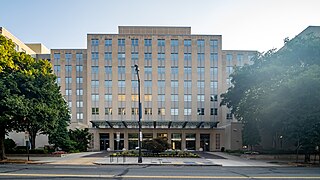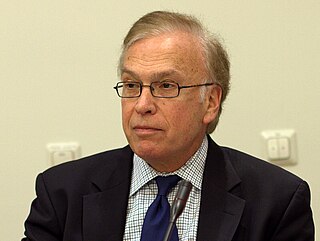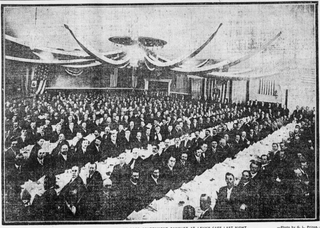Related Research Articles

A think tank,or public policy institute,is a research institute that performs research and advocacy concerning topics such as social policy,political strategy,economics,military,technology,and culture. Most think tanks are non-governmental organizations,but some are semi-autonomous agencies within a government,and some are associated with particular political parties,businesses,or the military. Think tanks are often funded by individual donations,with many also accepting government grants.
Good governance involves of evaluating how well public institutions manage Community assests,conduct public affairs,and ensure the realization of human rights in a way that is largely free from abuse and corruption and properly takes into account the rule of law. Governance refers to "the process of decision-making and the process by which decisions are implemented " . Governance in this context can apply to corporate,international,national,or local governance as well as the engagement with the other sectors of society.

The Brookings Institution,often stylized as Brookings,is an American think tank that conducts research and education in the social sciences,primarily in economics,metropolitan policy,governance,foreign policy,global economy,and economic development.
Governance is the overall complex system or framework of processes,functions,structures,rules,laws and norms born out of the relationships,interactions,power dynamics and communication within an organized group of individuals. It sets the boundaries of acceptable conduct and practices of different actors of the group and controls their decision-making processes through the creation and enforcement of rules and guidelines. Furthermore,it also manages,allocates and mobilizes relevant resources and capacities of different members and sets the overall direction of the group in order to effectively address its specific collective needs,problems and challenges.
The Institute for Research on Public Policy is an independent,national,bilingual,not-for-profit organization based in Montreal,Quebec. Its mission is to "improve public policy in Canada by generating research,providing insight and informing debate on current and emerging policy issues facing Canadians and their governments." It publishes peer-reviewed research and acts as a convenor of policy debates by organizing conferences,round tables and panel discussions among stakeholders,academics,policymakers and the general public. It is also the publisher of Policy Options magazine and the home of the Centre of Excellence on the Canadian Federation.

The American Political Science Association (APSA) is a professional association of political scientists in the United States. Founded in 1903 in the Tilton Memorial Library of Tulane University in New Orleans,it publishes four academic journals:American Political Science Review,Perspectives on Politics,Journal of Political Science Education, and PS –Political Science &Politics. APSA Organized Sections publish or are associated with 15 additional journals.
Education policy consists of the principles and policy decisions that influence the field of education,as well as the collection of laws and rules that govern the operation of education systems. Education governance may be shared between the local,state,and federal government at varying levels. Some analysts see education policy in terms of social engineering.
New public management (NPM) is an approach to running public service organizations that is used in government and public service institutions and agencies,at both sub-national and national levels. The term was first introduced by academics in the UK and Australia to describe approaches that were developed during the 1980s as part of an effort to make the public service more "businesslike" and to improve its efficiency by using private sector management models.
Adam Przeworski is a Polish-American professor of political science specializing in comparative politics. He is Carroll and Milton Professor Emeritus in the Department of Politics of New York University. He is a scholar of democratic societies,theory of democracy,social democracy and political economy,as well as an early proponent of rational choice theory in political science.

A public policy school or school of public affairs is typically a university program,institution,or professional school of public policy,public administration,political science,international relations,security studies,management,urban planning,urban studies,intelligence studies,global studies,emergency management,public affairs,nonprofit management,criminology,and the sociology of law.

Lester M. Salamon was a professor at Johns Hopkins University. He was also the director of the Center for Civil Society Studies at The Johns Hopkins Institute for Health and Social Policy Studies. Salamon has written or edited over 20 books in addition to hundreds of articles,monographs and chapters that have appeared in Foreign Affairs,The New York Times,Voluntas,and numerous other publications. He was a pioneer in the empirical study of the nonprofit sector in the United States,and is considered by many experts in his field to have been a leading specialist on alternative tools of government action and on the nonprofit sector in the U.S. and around the world.

The United States has a history of citizen,nonprofit,and other non-partisan groups advocating good government that reaches back to the late-19th-century municipal-level Progressive Movement and the development of governmental professional associations in the early part of the 20th century,such as the American Public Human Services Association and the International City/County Management Association. Many of these groups had their genesis at the Public Administration Center at 1313 East 60th Street,at the University of Chicago.
The Office of Social Innovation and Civic Participation was an office new to the Obama Administration,created within the White House,to catalyze new and innovative ways of encouraging government to do business differently. Its first director was the economist Sonal Shah. The final director was David Wilkinson.

Maya MacGuineas is president of the Committee for a Responsible Federal Budget. She is a frequent commentator on issues such as the federal budget,national debt,taxes,the economy,retirement policy,government reform,and health care.

Helmut K. Anheier is a German-American academic. He is professor of sociology and past president of the Hertie School in Berlin. Until September 2019 he held a chair at the Max Weber Institute of Sociology,Heidelberg University,where he was also the Academic Director of the Center for Social Investment and Innovation. His research interests include civil society,social innovation,organizational theory,governance and policy research,social science methodology,including indicator models

C. Eugene "Gene" Steuerle is an American economist,a Richard B. Fisher chair and Institute Fellow at the Urban Institute in Washington,DC,and a columnist under the title The Government We Deserve.

Shelley Hope Metzenbaum is an American nonprofit executive,academic,and former government official specializing in public sector performance management. She was the founding president of the Volcker Alliance and worked in the Office of Management and Budget during the Obama administration. Metzenbaum is a fellow of the National Academy of Public Administration.

Frederick M. Hess is an American educator,political scientist,and author. He is a resident fellow and director of education policy studies at the American Enterprise Institute,and the author of the popular blogs "Rick Hess Straight Up" at Education Week and "Old School with Rick Hess" at Education Next. He is a senior contributor to Forbes,an executive editor of Education Next, and a contributing editor to National Review. His books include Spinning Wheels,Letters to a Young Education Reformer,Cage-Busting Leadership,A Search for Common Ground,The Great School Rethink, and Getting Education Right.
Rashi Fein was an American health economist termed "a father of Medicare" in the United States and "an architect of Medicare",was Professor of Economics of Medicine,Emeritus,in the Department of Global Health and Social Medicine at Harvard Medical School,and the author of the book Medical Care,Medical Costs:The Search for a Health Insurance Policy.
Francis Michel Bator was a Hungarian-American economist and educator. He was a professor emeritus at Harvard Kennedy School of political economy. He was born in Budapest,Hungary. Bator attended the Massachusetts Institute of Technology and earned a Ph.D. in 1956. He was Deputy National Security Advisor of the United States from 1965 to 1967. He was also a Special Assistant to President Lyndon B. Johnson.
References
- ↑ "Paul Light". NYU Wagner.
- ↑ "Organized Section 6: Herbert A. Simon Book Award". American Political Science Association (APSA).